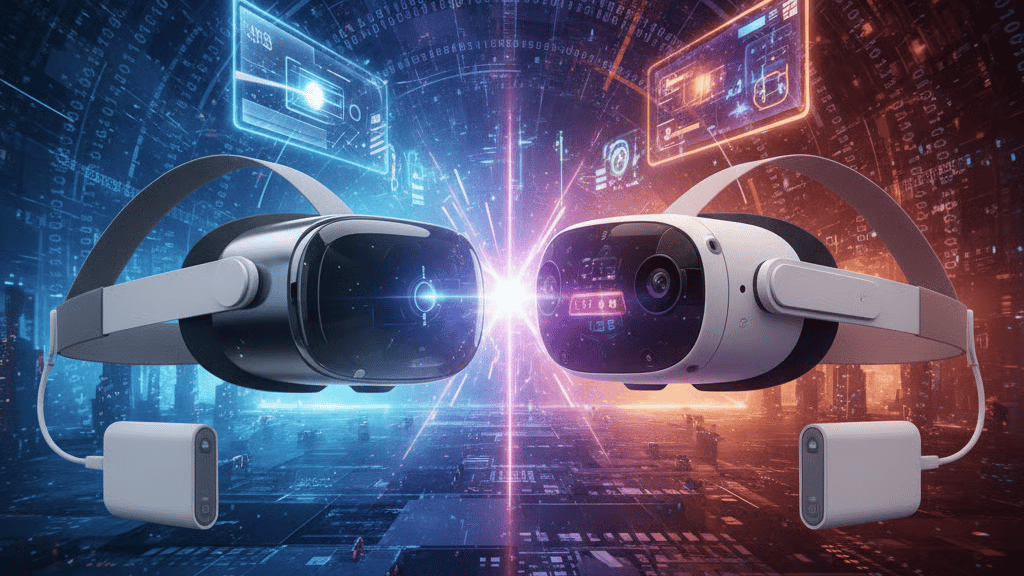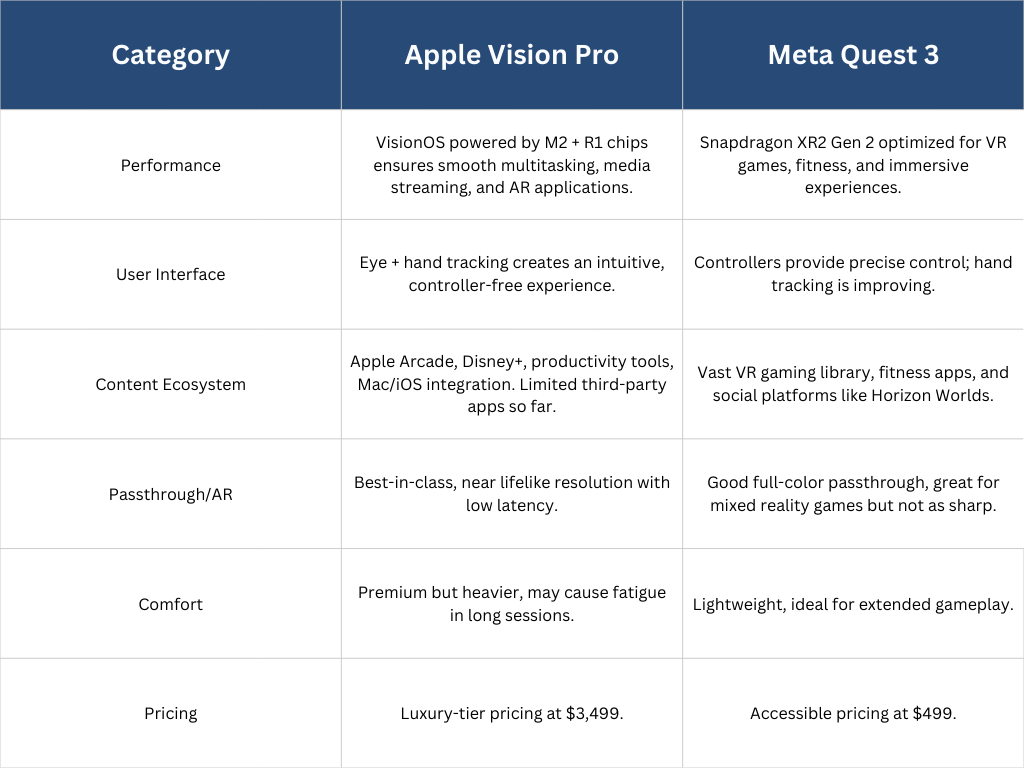Spatial Computing 2025: Vision Pro vs Quest 3
Priyanshu - Bit Wise Reviews
11/3/2025


The spatial computing world is rapidly changing the way people engage with technology. In 2025, these two headsets will dominate this new domain -Apple Vision Pro and Meta Quest 3.
Although both strive to integrate physical and digital experiences, they are entirely in two totally different directions. Apple is concerned with precision, productivity, and immersion, whereas Meta is concerned with mass accessibility and gaming.
This detailed comparison explores their hardware, ecosystems, and real-world performance to determine which headset truly leads the race in spatial computing.
What Is Spatial Computing?
The next stage of digital interaction is spatial computing, which is the combination of the real world with the virtual one in real time.
Rather than an old-fashioned screen, users enjoy the 3D digital content based on real-life and managed with the help of eye, hand, or voice movements.
Apple's Vision Pro is a "spatial computer" that emphasizes the seamless working of apps, work tools, and entertainment in physical space.
Meta, through the Quest 3, is centered on mixed reality through which games and apps superimpose the actual surroundings of the user.
Concisely, spatial computing transforms your surrounding world into your interface.
Read More: Cloud Gaming in 2025: Xbox, PlayStation & PC Guide
Apple Vision Pro: Redefining the Premium Segment
The Apple Vision Pro ain't just a headset -- it's Apple's vision for the future of computing.
Since its release, it positioned itself as a high-end product based on innovation, design, and performance.
Key Highlights
Combined killer micro-OLED displays of more than 23 million pixels.
Apple M2 + R1 dual chip architecture.
Vision OS: The first spatial operating system at Apple.
Eye, hand, voice (no controllers needed).
Exchangeable power pack with an approximate 2 hours of usage.
Launch price: $3,499 (US)
Official site: apple.com/apple-vision-pro
Meta Quest 3: Accessibility Meets Performance
If the Vision Pro represents the future of professional computing, the Meta Quest 3 represents the democratization of mixed reality.
It is aimed at all people, gamers, students, and ordinary users who want to experience MR at an affordable price.
Key Highlights
Smartphone runs on Qualcomm Snapdragon XR2 Gen 2.
2064 x 2208 per eye LCD resolution
120 Hz refresh rate (PC link) maximum.
Mixed reality full-color passthrough cameras.
Quest 2 library is backward compatible.
Price: $499 (US)
Meta Quest 3 is easy to set up because all one has to do is turn it on, scan the room, and you are ready to explore.
It is a well-balanced interactive software that has fast-paced experiences like Beat Saber and productive applications such as Immersed.
Official site: meta.com/quest/quest-3
Verdict:
The Apple Vision Pro provides the best visuals and spatial control in the industry, whereas Meta Quest 3 is more practical and affordable.
Apple provides users with unparalleled immersion, but Meta brings mixed reality to the general population
Read More: Improve WiFi Speed on a Laptop in 2025: Ultimate Guide
Direct Comparison


Performance and Experience in the Real World
The Vision Pro is nearer to a film experience.
Its graphic presentation, eye tracing, and the audio space effect create the impression of being there. The digital elements are presented in a manner that they seem to be anchored well to the real world, and this makes it ideal in terms of productivity, design, and immersive content.
Nevertheless, it does not lack restrictions. Long sessions can be characterized by the noticeableness of the external battery and weight.
In the case of gaming, there is not as wide a range of available choices as the massive VR ecosystem of Meta.
The Quest 3, on the contrary, is agile and fun to use.
It is ideal when playing games casually, when using it in fitness apps, and when having immersive experiences.
The new XR2 Gen 2 chip maintains performance, and the inclusion of PC VR connectivity via Air Link further increases its performance.
It is not as deep and faithful as Vision Pro, whereas the convenience and multidimensionality make Quest 3 a more viable everyday tool.
Also Read: Web3 Gaming Platforms: How Players Will Own the Future
Pros and Cons
Apple Vision Pro
Pros:
Display and build quality of the best.
Impeccable tracking and control.
Close integration with the ecosystem of Apple.
Media-friendly and creative process.
Cons:
Costly- not affordable to normal consumers.
Limited gaming library
The external pack has a short battery life.
Meta Quest 3
Pros:
Affordable and lightweight
High-end size library and back compatibility.
Self-contained system- No PC needed.
It can have a longer duration of use.
Cons:
The screen is not as crisp as Apple's micro-OLED.
The quality of the building is lower.
Less precise mixed reality depth.
The Future of Spatial Computing
Spatial computing is no longer all about entertainment.
With the advance of AI and integration of cloud gaming, 5G, these headsets will substitute laptops and monitors in most situations.
Key Trends to Watch (2025-2027)
Integration of cloud gaming: Project AAA games into space environments.
Hybrid productivity: Virtual offices become the norm.
Cross-platform ecosystems: The similarity of Apple, Meta, and Microsoft app stores.
Hardware development: Thinner and lightweight headsets with battery life for all day.
Enterprise adoption: Training, design, and medical progressively based on MR.
Statista (2025) predicts that the AR/VR market will grow above 50 billion dollars in 2027, and that both Apple and Meta will be the primary drivers of this expansion.
Apple is likely to take control of enterprise and creative markets, with Meta remaining a market leader in terms of consumer adoption.
Final Verdict
Both the Apple Vision Pro and Meta Quest 3 symbolize two sides of the same revolution.
One determines the future of high-end computing, the other determines the future of accessible immersion.
Apple Vision Pro: It is designed for professionals, creators, and tech enthusiasts who want precision, perfection, a good experience, and spatial productivity.
Meta Quest 3: It is built for gamers, regular users, and early adopters who are seeking affordable access to mixed reality.
Quick Summary
Productivity & Workflows - Apple Vision Pro
For Gaming & Entertainment purposes - Meta Quest 3
Ecosystem Integration - Apple Vision Pro
Value for Money - Meta Quest 3
It is based not just on an advancement in technology, but is the basis of the post-screen era: spatial computing.
Both headsets are defining the way the world will relate to digital realms in the next decade, whether it is through the sleek refinement of an Apple customer experience or by the affordability and functionality of a Meta customer experience.
About The Author
Hey there! I’m Priyanshu, the founder and editor behind Bit Wise Reviews — a platform dedicated to making technology easy to understand for everyone.
I started this website with a simple idea:
“Tech doesn’t have to be complicated — it just needs to be explained the right way.”
INSIGHTS
Your go-to source for latest tech gadgets news
Support
Connect
© 2025. Bit Wise Reviews
+91 6377810443
Quick Links
